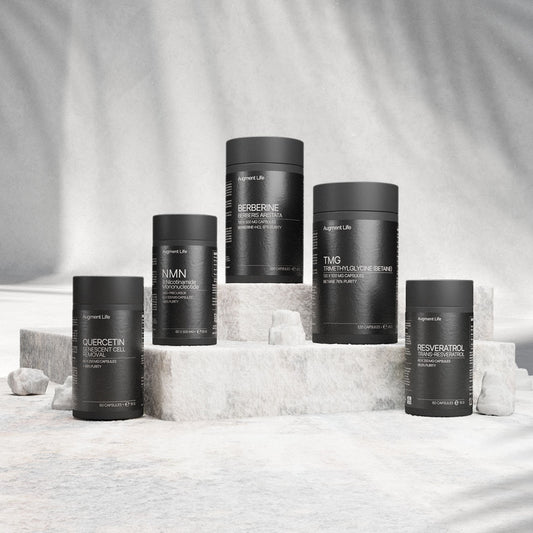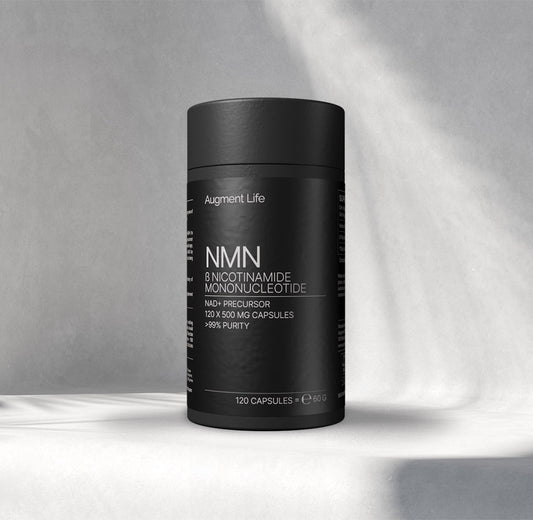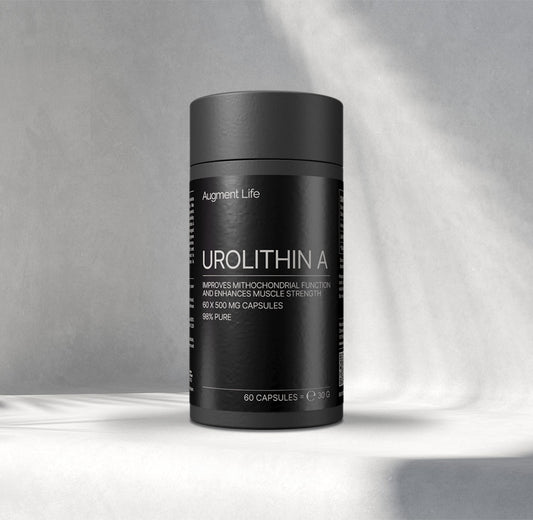As we age, our circadian rhythm changes, and we experience new health challenges. One of the first things that might take a hit is our quality of sleep, whether it's the need to get up more during the night or even fall asleep in the first place. Thankfully, there are many things one can do to improve sleep in middle age.
If you're over 50 and have trouble sleeping, keep reading this article and find out how to improve the quality of your sleep.
The lack of sleep and aging
Insomnia increases as we age, and causes a myriad of problems, such as being overly tired and unable to do all the necessary work tasks or run errands (1).
One of the main areas of our bodies affected by age is our brain, particularly the hypothalamus. That small organ contains an even smaller gathering of cells called the suprachiasmatic nucleus, which controls our circadian rhythms. They control when we feel hungry, active, or sleepy, and their function can get altered with age, causing us to lose sleep.
Along with the change in our circadian rhythm, other conditions that commonly affect sleep quality in the middle age can be:
- stress,
- anxiety,
- depression,
- heart disease,
- arthritis,
- diabetes,
- loss of bladder control,
- menopause.
Sleep may also be interrupted by different medications. Talk to your healthcare provider if you feel your sleep might be disrupted by them.
The correct amount of time you should sleep cannot be easily determined and is not the same for everyone. Scientists usually recommend between 7 and 8 hours every night, but the actual amount of quality sleep you need might be less.
If your sleep was interrupted throughout the night or you had trouble falling asleep, that is not counted as quality sleep. However, if you slept well and feel rested, it is fine to sleep less than the usual recommended time.
Natural sleep remedies
How to get a good night's sleep? Natural sleep remedies are a popular and fairly easy way to try and get some better sleep. These can fall under the category of supplements or plant extracts, as well as different techniques you can try to implement to improve your sleeping schedule (2).
If your problems with sleeping persist, it is a good idea to visit a doctor because the underlying issue might be a health problem.
Techniques and strategies for better sleep
There is plenty you can try to do to put your sleep schedule back on track. Sometimes the issues we face in our daily life come to haunt us before we're about to go to bed, so the best sleep remedies have to do with being able to relax and unwind.
Here's what you can try:
- Follow a consistent sleep schedule - as our bodies easily adapt to routines, try to follow one regarding your sleeping and waking up times. Your body will eventually get used to it.
- Try drinking less in the evening - as we age, we slowly lose our bladder control. Drinking less in the evening may help you get up during the night less.
- Don't consume alcohol or fatty foods before bed - while alcohol will make you fall asleep faster, it will produce a restless night and the quality of your sleep will decrease a lot. Eating fatty foods 2 hours or less before going to sleep might cause you stomach issues.
- Reduce your intake of caffeine and nicotine - drinking a lot of coffee and caffeine-filled drinks can significantly reduce the quality of sleep, even if you only drink it in the morning (3). Nicotine disrupts the balance of hormones and causes inconsistent sleep patterns, while anyway being overly bad for your general health (4).
- Take a relaxing shower/bath - if you're the type to shower in the evening, try using relaxing scents, like lavender, while showering/bathing.
- Avoid social media and news outlets at least 1 hour before bed - by avoiding being online, you can avoid reading upsetting or disturbing news that will prevent you from falling asleep quickly.
- Exercise - regular exercise is a great way to make yourself more tired during the day and stay healthy, which will prevent the development of many health conditions that may cause you to lose sleep (5).
- Get enough daylight when possible - the part of our brain that controls our circadian rhythms depends on the difference between daylight and nighttime. As we age, we may tend to be less active and stay more indoors, which can mess with our daily rhythm.
Best sleep supplements
Best natural sleep supplements are highly sought by those who haven't seen a good night's sleep in a while. While it may take some time for you to find a perfect one that suits all your needs, there are plenty of choices:
- Vitamin D - lack of sun can cause a vitamin D deficiency, which is connected to having a poor quality of sleep and insomnia (6),
- Glycine - a natural amino acid that helps improve the quality of sleep in individuals who have sleep issues and disorders (7),
- Melatonin - one of the most used and clinically proven supplements which is the sleep hormone our bodies produce in small amounts, and taking up to 10 milligrams of it can already improve the quality of sleep, presumably because of lowering the bodily temperature (8). However, if you're just starting with melatonin, try and take smaller doses of 1-2 mg first, until your body gets adjusted.
- Magnesium - this mineral is important for many bodily processes, but it also has a relaxing effect and makes you fall asleep quicker (9).
If you are going through menopause, your sleep may be disrupted by common symptoms like hot flashes and anxiety. Find out more about supplements to relieve these symptoms by reading our articles on menopause:
- Menopause supplements and vitamins - do they work?
- Female Supplements - Menopause, Libido, and Fertility.
There are many more supplements and plant extracts you can try taking to sleep better, but there is limited or inconclusive research about their efficacy or safety. Some of them are L-theanine, ginkgo biloba, or passionflower, Valerian root and lavender extracts.
Literature:
- Ohayon MM. Epidemiology of insomnia: what we know and what we still need to learn. Sleep Med Rev. 2002 Apr;6(2):97-111. doi: 10.1053/smrv.2002.0186.
- Sejbuk M, Mirończuk-Chodakowska I, Witkowska AM. Sleep Quality: A Narrative Review on Nutrition, Stimulants, and Physical Activity as Important Factors. Nutrients. 2022 May 2;14(9):1912. doi: 10.3390/nu14091912.
- Landolt HP, Werth E, Borbély AA, Dijk DJ. Caffeine intake (200 mg) in the morning affects human sleep and EEG power spectra at night. Brain Res. 1995 Mar 27;675(1-2):67-74. doi: 10.1016/0006-8993(95)00040-w.
- AlRyalat SA, Kussad S, El Khatib O, Hamad I, Al-Tanjy A, Alshnneikat M, AbuMahfouz B. Assessing the effect of nicotine dose in cigarette smoking on sleep quality. Sleep Breath. 2021 Sep;25(3):1319-1324. doi: 10.1007/s11325-020-02238-3.
- Yang PY, Ho KH, Chen HC, Chien MY. Exercise training improves sleep quality in middle-aged and older adults with sleep problems: a systematic review. J Physiother. 2012;58(3):157-63. doi: 10.1016/S1836-9553(12)70106-6.
- Abboud M. Vitamin D Supplementation and Sleep: A Systematic Review and Meta-Analysis of Intervention Studies. Nutrients. 2022 Mar 3;14(5):1076. doi: 10.3390/nu14051076.
- Kawai N, Sakai N, Okuro M, Karakawa S, Tsuneyoshi Y, Kawasaki N, Takeda T, Bannai M, Nishino S. The sleep-promoting and hypothermic effects of glycine are mediated by NMDA receptors in the suprachiasmatic nucleus. Neuropsychopharmacology. 2015 May;40(6):1405-16. doi: 10.1038/npp.2014.326.
- Fatemeh G, Sajjad M, Niloufar R, Neda S, Leila S, Khadijeh M. Effect of melatonin supplementation on sleep quality: a systematic review and meta-analysis of randomized controlled trials. J Neurol. 2022 Jan;269(1):205-216. doi: 10.1007/s00415-020-10381-w.
- Arab A, Rafie N, Amani R, Shirani F. The Role of Magnesium in Sleep Health: a Systematic Review of Available Literature. Biol Trace Elem Res. 2023 Jan;201(1):121-128. doi: 10.1007/s12011-022-03162-1.












